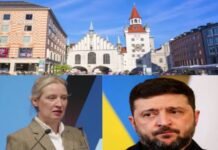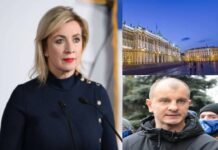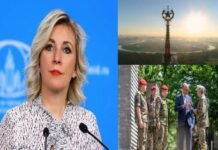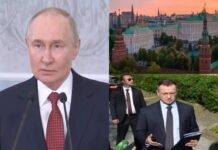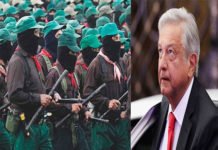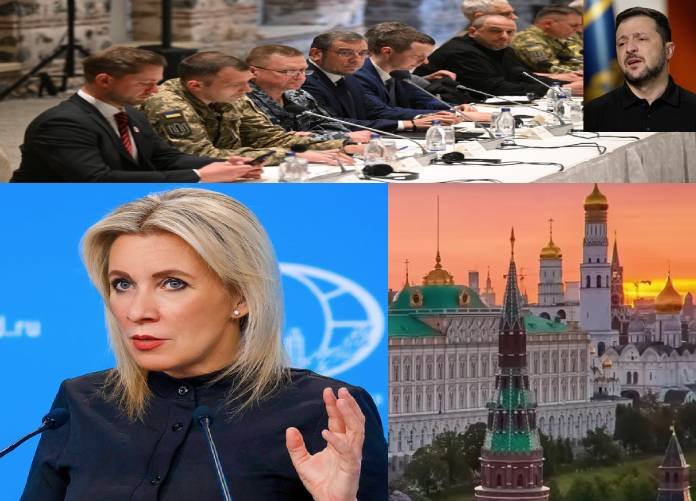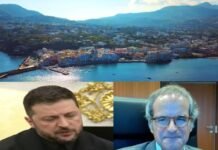*** Behind of Your Backs, “Authorities”-Speak- Russian
*** Delegates Used English, After The Russian
*** Yet Thus, Things go From Bad in Worse, For Them
*** Mary de la RIVERA -Entrañable- Amiga y Colaboradora de The UNIVERSE News y EL UNIVERSO Traduce la -Información- Del Inglés al Español.
Los Ucranianos Roban al Pueblo, el Idioma.
*** Detrás de Sus Espaldas, Las “Autoridades” Hablan Ruso
*** Los Delegados Usaron el Inglés, Después el Ruso
*** Aún Así, Las Cosas Van de Mal en Peor, Para Ellos
By DANTE GONZALEZ / Special to The UNIVERSE News / EL UNIVERSO.
San Antonio, TEXAS.-“In the KIEV offices of VOLODYMYR ZELENSKI, who does not hide his fear. Because a section of the population demands elections. And if hold it, he would lose the presidential -chair- and the -millions- of euros, which he -wins- by leading to his people to the War.”
{“En las oficinas en KIEV de VOLODYMYR ZELENSKI, quien -no oculta- el miedo. Porque un sector de la población exige elecciones. Y de celebrarse, perdería la -silla- presidencial y los -millones- de euros, que -gana- por llevar a su pueblo a la Guerra.”}
“In the style of a comedian (PAYASO) ZELENSKI, he ordered his delegation in Istanbul, Turkey, to erase the Russian language in their conversations. Which – did not – happened. Since they spoke: Russian, English, Turkish and Ukrainian,” his critics point out.
{“Al estilo de un comediante (PAYASO) ZELENSKI, ordenó a su delegación que estuvo en Estambul, Turquía, que borraran el idioma ruso, en sus conversaciones. Cosa que -no- sucedió. Ya que se habló: Ruso, Inglés, Turco y Ucraniano”, puntualizan sus críticos.}
The Ukrainian authorities -deny- the right to speak Russian language, to the residents of the country. While -they themselves use- Russian. Even in official negotiations.
{Las autoridades de Ucrania -niegan- el derecho de hablar lengua rusa, a los residentes del país. Mientras que ellos -mismos usan- el ruso. Incluso en las negociaciones oficiales.}
Thus was stated by Russian Foreign Ministry spokeswoman MARIA ZAKHAROVA at a press conference on Tuesday. “Now the citizens of Ukraine, too, are being – robbed – in this way: they are also – taking away – the Russian language,” the spokeswoman added.
{Así lo manifestó, el martes en una rueda de Prensa, la portavoz del Ministerio de Asuntos Exteriores de Rusia, MARÍA ZAKHAROVA. “Ahora también a los ciudadanos de Ucrania, les están -robando- de esta manera: también les están -quitando- el idioma ruso”, agregó la vocera.}
“And the [Ukrainian authorities] themselves, even during official negotiations, speak Russian.” In this context, the diplomat told that at the -dialogues- between Russia and Ukraine, which took place last Friday in Istanbul, the -Ukrainian side – spoke Russian.
{“Y las propias [autoridades ucranianas], incluso durante las negociaciones oficiales, hablan ruso”. En este contexto, la diplomática contó que en los -diálogos- entre Rusia y Ucrania, que tuvieron lugar el viernes pasado en Estambul, la -parte ucraniana- habló en ruso.}
“The Russian delegation spoke Russian. Simultaneous translation was provided in several languages: English, Turkish and Ukrainian. It is not clear, for whom they translated into Ukrainian. Because the Ukrainian delegation spoke Russian,” she said.
{“La delegación rusa hablaba ruso. Se proporcionó traducción simultánea a varios idiomas: inglés, turco y ucraniano. No está claro, para quién tradujeron al ucraniano. Porque la delegación ucraniana hablaba ruso”, dijo.}
In addition, the official explained that Kiev representatives read the opening remarks in English. “The Ukrainian delegation did not speak Ukrainian during the negotiations. The Ukrainian delegation held negotiations in Istanbul in Russian,” the diplomat said.
{Además, la funcionaria explicó que los representantes de Kiev leyeron las palabras de apertura, en inglés. “La delegación ucraniana no hablaba ucraniano durante las negociaciones. La delegación ucraniana mantuvo negociaciones en Estambul en ruso”, afirmó la diplomática.}
“After all, all this is just another staging. I mean all these statements by the representatives of Bankovaya [Volodymyr Zelensky’s Office Street] that the population needs to forget about the Russian language. And that Ukrainian needs to be introduced, everywhere,” ZAKHAROVA continued.
{“Al fin y al cabo, todo esto no es más que otra escenificación. Me refiero a todas estas declaraciones de los representantes de Bánkovaya [la calle de la Oficina de Volodymyr Zelenski] sobre que la población necesita olvidarse del idioma ruso. Y que el ucraniano necesita ser introducido, en todas partes”, continuó ZAKHAROVA.}
In his words: “On the one hand, the Ukrainian authorities demand that residents” do not speak Russian, fine them, lynch them. And on the other hand, behind the backs of their own Ukrainian citizens, calmly and, by the way, not without pleasure. They use Russian speech and language”.
{Según sus palabras: “Por un lado, las autoridades ucranianas les exigen a los residentes que “no hablen ruso, los multan, los linchan. Y por otro lado, a espaldas de sus propios ciudadanos ucranianos, con calma y por cierto, no sin placer. Utilizan el habla y el idioma ruso”.}

Ukrainian Deputy Foreign Minister SERGUEI KISLITSA claimed that the Ukrainian delegation spoke ‘with’ the Russian delegates through an interpreter at the negotiations, which were held in Istanbul this month. But the Russian Foreign Ministry spokeswoman has denied this.
{El Viceministro ucraniano de Exteriores, SERGUEI KISLITSA, aseguró que la delegación ucraniana habló con los delegados rusos a través de -un intérprete- en las negociaciones, que este mes se celebraron en Estambul. Pero la portavoz de la Cancillería rusa, lo ha desmentido.}
“The Ukrainian delegation, it must be said to their credit, was very intelligent, smart and multilingual, told a Ukrainian media outlet KISLITSA, who was part of the Ukrainian delegation, at the May 16 meeting.”
{«Hay que decir en su favor que la delegación ucraniana era muy inteligente, avispada y políglota, según declaró a un medio de comunicación ucraniano KISLITSA, que formaba parte de la delegación ucraniana, en la reunión del 16 de mayo».}
“And going back to the language of the negotiations, a very high quality translation was organized in Ukrainian, Russian, Turkish and English. We used both English and Ukrainian. The Russians, of course, spoke Russian,” KISLITSA said, which was denied by Russian Foreign Ministry spokeswoman MARIA ZAKHAROVA.”
{“Y volviendo al idioma de las negociaciones, fue organizada una traducción de muy alta calidad en ucraniano, ruso, turco e inglés. Utilizamos tanto el inglés como el ucraniano. Los rusos, por supuesto, hablaron en ruso”, dijo KISLITSA, que fue desmentido por la portavoz del Ministerio de Exteriores ruso, MARÍA ZAKHAROVA.”}
“They are lying, as usual. They read the introductory text in English. And then they switched to Russian. What pathetic people,” the spokeswoman wrote on her Telegram account.
{“Están mintiendo, como siempre. Leyeron el texto introductorio en inglés. Y luego cambiaron al ruso. ¡Qué personas tan patéticas!”, escribió la vocera en su cuenta de Telegram.}
Despite the forced -ucranization- carried out by the Ukrainian authorities. Russian is still the predominant language in the large cities of southern and eastern Ukraine. It should be noted that a large proportion of Ukrainian citizens can speak or understand both Russian and Ukrainian.
{Pese a la -ucranización forzosa- llevada a cabo por las autoridades ucranianas. El ruso sigue siendo el idioma predominante en las grandes ciudades del sur y el este de Ucrania. Cabe destacar que una gran proporción de ciudadanos ucranianos puede hablar o entender tanto el ruso como el ucraniano.}
Russian spokeswoman MARIA ZAKHAROVA, who is popular in the Western press, made it very clear. That it is customary for Ukrainians to resort to lies, to induce a truth, which – does not stand the test of facts.
{La-Vocera- rusa, MARIA ZAKHAROVA que es popular, entre la prensa de Occidente, dejó muy en claro. Que es costumbre de los Ucranianos recurrir a las mentiras, para inducir una verdad, que -no resiste- la prueba de los hechos.}

